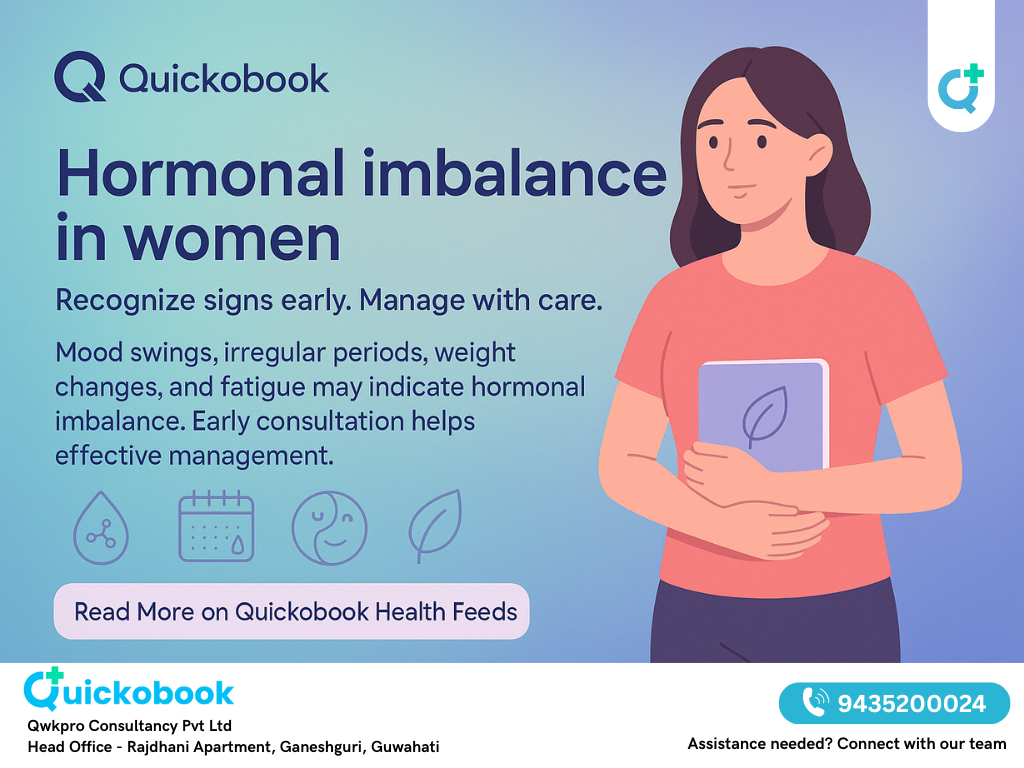Introduction
Hormones play a vital role in regulating many functions in a woman’s body—from menstruation and fertility to mood, metabolism, and bone health. When there is a hormonal imbalance, it can affect overall well-being and lead to conditions like PCOS, thyroid issues, and difficulties during menopause. Recognizing the signs early and seeking timely help from a gynecologist is crucial for long-term health.
This blog explains the causes, symptoms, diagnosis, and management strategies for hormonal imbalance in women. It also highlights lifestyle tips, treatment options, and how platforms like Quickobook make it easier to connect with trusted doctors near you.
What is Hormonal Imbalance?
Hormonal imbalance occurs when there is too much or too little of a hormone in the bloodstream. Since hormones control essential processes such as metabolism, reproduction, and mood regulation, even slight imbalances can cause noticeable changes in the body.
Causes of Hormonal Imbalance in Women
- Polycystic Ovary Syndrome (PCOS) – One of the most common causes, leading to irregular cycles, infertility, and weight gain.
- Menopause and Perimenopause – Natural decline in estrogen and progesterone levels.
- Thyroid Disorders – Hypothyroidism or hyperthyroidism affect metabolism and menstrual cycles.
- Stress – Excess cortisol disrupts normal hormone balance.
- Poor Diet and Lifestyle – High sugar, processed food, and lack of exercise.
- Medications – Birth control pills or hormone replacement therapies.
- Other Health Conditions – Diabetes, obesity, or pituitary gland problems.
Signs and Symptoms of Hormonal Imbalance
- Irregular or missed periods
- Heavy menstrual bleeding
- Severe PMS or mood swings
- Acne and hair loss
- Excessive facial or body hair (hirsutism)
- Weight gain or difficulty losing weight
- Low energy and fatigue
- Night sweats and hot flashes (especially in menopause)
- Vaginal dryness
- Infertility or difficulty conceiving
Diagnosis
A gynecologist may recommend the following tests:
- Blood tests – To check estrogen, progesterone, testosterone, thyroid, and insulin levels.
- Pelvic ultrasound – To detect PCOS or ovarian cysts.
- Physical examination – Checking weight, hair growth, and skin condition.
- Other hormonal tests – Depending on symptoms (e.g., cortisol levels).
Management and Treatment
Medical Treatments
- Birth control pills – To regulate menstrual cycles.
- Hormone replacement therapy (HRT) – Especially for menopause symptoms.
- Fertility treatments – For women with PCOS-related infertility.
- Medications for thyroid disorders – Levothyroxine for hypothyroidism, antithyroid drugs for hyperthyroidism.
- Insulin-sensitizing medications – Such as metformin in PCOS cases.
Lifestyle Modifications
- Balanced Diet – High in fiber, fruits, vegetables, whole grains, and lean proteins.
- Regular Exercise – Helps in weight management and insulin sensitivity.
- Stress Management – Yoga, meditation, and adequate sleep.
- Limit Sugar and Junk Food – To avoid insulin resistance.
- Quit Smoking and Alcohol – To improve hormone health.
Preventive Measures
- Get regular health checkups with a gynecologist.
- Maintain a healthy weight.
- Track your menstrual cycle.
- Stay physically active.
- Take vitamin D and calcium for bone health.
- Discuss family history of hormonal disorders with your doctor.
When to See a Gynecologist
- If you have irregular cycles for more than 3 months.
- Severe PMS or menopausal symptoms.
- Difficulty conceiving after a year of trying.
- Sudden weight gain, hair loss, or unwanted hair growth.
- Persistent fatigue, mood changes, or sleep problems.
Booking an appointment is easy through Quickobook, which connects you to trusted gynecologists and specialists near you.
Risks and Complications
- PCOS complications – Infertility, type 2 diabetes, heart disease.
- Untreated thyroid issues – Can cause long-term heart and metabolic problems.
- Menopause without management – Leads to osteoporosis, cardiovascular risk.
- Mental health effects – Anxiety, depression, and poor quality of life.
Conclusion
Hormonal imbalance in women is common but manageable with timely diagnosis, proper treatment, and lifestyle changes. Conditions like PCOS and menopause require personalized care from a gynecologist. Remember, early intervention reduces long-term complications.
With Quickobook, finding the right gynecologist and booking consultations is just a click away. Take control of your health today.
50 FAQs on Hormonal Imbalance in Women
Q1. What is hormonal imbalance in women?
A. It is when hormones like estrogen, progesterone, or thyroid are too high or too low, causing health issues.
Q2. Can PCOS cause hormonal imbalance?
A. Yes, PCOS is one of the most common causes of hormonal imbalance in young women.
Q3. What are the first signs of hormonal imbalance?
A. Irregular periods, mood swings, acne, and weight gain are early signs.
Q4. Is menopause a type of hormonal imbalance?
A. Yes, during menopause estrogen and progesterone levels drop, leading to imbalance.
Q5. How do doctors diagnose hormonal imbalance?
A. Through blood tests, physical exams, and ultrasounds if needed.
Q6. Can stress cause hormonal imbalance?
A. Yes, excess cortisol disrupts other hormones in the body.
Q7. Does thyroid disorder affect women’s hormones?
A. Yes, thyroid imbalance can lead to irregular cycles and mood changes.
Q8. Can hormonal imbalance cause infertility?
A. Yes, especially due to PCOS, thyroid issues, or irregular ovulation.
Q9. How does weight affect hormones?
A. Obesity increases insulin resistance, worsening hormonal imbalance.
Q10. Can diet correct hormonal imbalance?
A. A healthy diet supports balance but medical help may be needed too.
Q11. Does exercise help balance hormones?
A. Yes, regular physical activity improves metabolism and hormone regulation.
Q12. Can menopause symptoms be treated?
A. Yes, with hormone replacement therapy (HRT) and lifestyle adjustments.
Q13. How does PCOS affect periods?
A. It causes irregular or missed periods due to lack of ovulation.
Q14. What role does estrogen play in women’s health?
A. It regulates menstrual cycles, bone health, and mood.
Q15. Can birth control pills regulate hormones?
A. Yes, they are often prescribed to manage irregular cycles.
Q16. What is the link between hormones and acne?
A. High androgens stimulate oil production, causing acne.
Q17. Can menopause cause weight gain?
A. Yes, hormonal shifts slow metabolism, leading to weight gain.
Q18. Do hormonal imbalances cause depression?
A. Yes, mood swings and depression are common in imbalance.
READ ALSO: Infertility In Men And Women – Causes And Solutions
Q19. Can hormonal imbalance cause hair loss?
A. Yes, high androgens can lead to thinning hair.
Q20. How is thyroid-related hormonal imbalance treated?
A. With medicines like levothyroxine or antithyroid drugs.
Q21. Can young girls have hormonal imbalance?
A. Yes, it can occur during puberty due to hormonal shifts.
Q22. Can lifestyle changes cure PCOS?
A. Lifestyle changes help but medical treatment is often needed.
Q23. What foods support hormone balance?
A. Whole grains, fruits, vegetables, and lean proteins are helpful.
Q24. Can smoking affect hormones?
A. Yes, smoking worsens hormonal imbalance and fertility issues.
Q25. Is yoga useful for hormonal health?
A. Yes, yoga reduces stress and improves hormonal regulation.
Q26. Can irregular sleep affect hormones?
A. Yes, poor sleep disrupts cortisol and reproductive hormones.
Q27. Are hot flashes only linked to menopause?
A. Mostly yes, but thyroid issues can also cause them.
Q28. Can hormonal imbalance cause osteoporosis?
A. Yes, especially after menopause when estrogen declines.
Q29. Do women with PCOS always gain weight?
A. Not always, but many struggle with weight management.
Q30. How does insulin resistance relate to PCOS?
A. It worsens PCOS symptoms and increases diabetes risk.
Q31. Is hair growth on the face a sign of imbalance?
A. Yes, excess androgens cause unwanted hair growth.
Q32. Can menopause cause sleep disturbances?
A. Yes, night sweats and hot flashes disrupt sleep.
Q33. What is perimenopause?
A. The transition phase before menopause with fluctuating hormones.
Q34. Can hormonal imbalance cause memory problems?
A. Yes, especially during menopause.
Q35. Are there natural remedies for imbalance?
A. Some herbs help, but medical advice is essential.
Q36. Can pregnancy cause hormonal imbalance?
A. Yes, hormones shift drastically during and after pregnancy.
Q37. What is the role of progesterone?
A. It helps regulate menstrual cycles and supports pregnancy.
Q38. Can hormone therapy cause side effects?
A. Yes, risks include weight gain and cardiovascular issues.
Q39. How often should women get hormone tests?
A. Based on symptoms, but yearly checkups are recommended.
Q40. Can men also have hormonal imbalance?
A. Yes, though this blog focuses on women.
Q41. Can hormonal imbalance cause digestive issues?
A. Yes, it can slow digestion and cause bloating.
Q42. What is the link between cortisol and weight?
A. High cortisol from stress increases belly fat.
Q43. Can untreated PCOS cause diabetes?
A. Yes, due to insulin resistance.
Q44. Can low estrogen cause vaginal dryness?
A. Yes, especially after menopause.
Q45. Can teenage girls develop PCOS?
A. Yes, PCOS often begins in teenage years.
Q46. Do supplements help in hormone balance?
A. Vitamin D, omega-3, and magnesium may support balance.
Q47. Can alcohol affect hormones?
A. Yes, alcohol disrupts estrogen and insulin regulation.
Q48. Can hormonal imbalance cause breast tenderness?
A. Yes, especially with high estrogen.
Q49. Does every woman need HRT in menopause?
A. No, it depends on symptoms and doctor’s advice.
Q50. How can Quickobook help with hormonal imbalance?
A. Quickobook connects you with expert gynecologists for timely care.
Disclaimer
This blog is for educational purposes only and does not replace professional medical advice. Always consult a qualified gynecologist for diagnosis and treatment. Medication and therapy should only be taken under a doctor’s supervision.









Comments (0)
No comments yet. Be the first to share your thoughts!
Leave a Comment